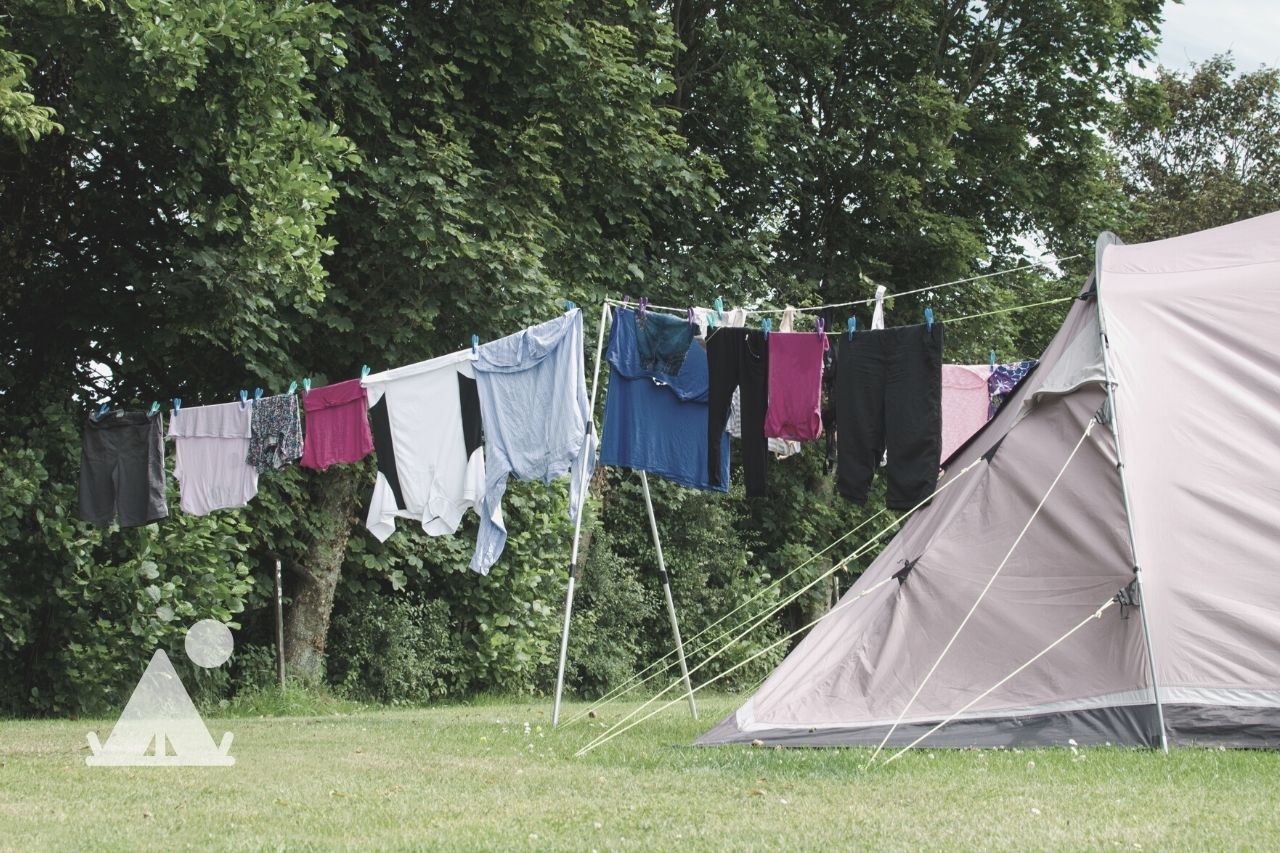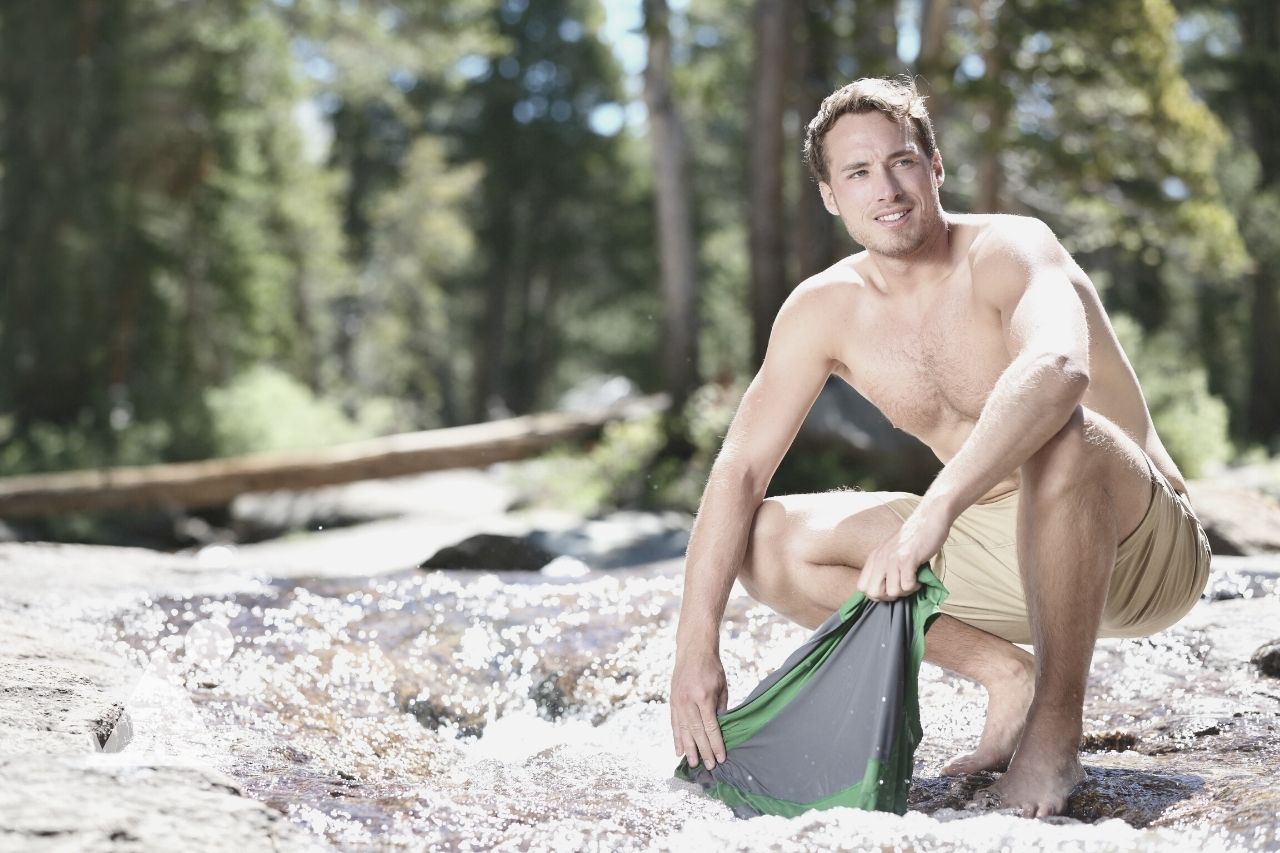Unless you are RV camping and have a washing machine in your vehicle, you’ll have to do your laundry manually when camping. Thankfully, there are plenty of tools to make the task less tedious. Here are the best tips on how to wash clothes while camping.
Can You Camp Without Washing Clothes?

If you ask some campers what’s the best way to wash clothes when on a camping trip, they’ll tell you that it is not to wash clothes at all.
If you can, carry enough clean clothes to last the entire camping trip. It’ll save you the hassle of washing clothes and you can wait until you get back home to do laundry.
However, this only works for short camping trips lasting 1-3 days.
You need to think about how much weight and space multiple changes of clothes will take. In some cases, it is better to carry fewer clothes and wash them when they get dirty.
If you are backpacking, you cannot carry too many clothes – probably a day or two worth of wear. If you plan several days or weeks of backpacking, doing laundry on the trail is the best option.
If you are driving to the camping site, you can carry more clothes but you are still limited by how much space you have in your vehicle. You can probably pack clothes for about three days max.
For short camping trips, it’s best to carry enough clean clothes and then do laundry once you come back home.
For longer camping trips or if you want to travel as light as possible, use one of the methods below for doing laundry in the wild.
6 Ways To Wash Clothes While Camping
1. Wash Bag or Dry Bag
For most campers, a wash bag is the most convenient way to wash clothes. The wash bag takes minimal space and it’s easy to use.
If you do not have a wash bag, you can also use a waterproof dry bag or a plastic trash bag.
To use a wash bag, you put the dirty clothes inside and then add water (hot, warm or cold depending on the type of clothes) and biodegradable soap.
You then seal the bag. Press and roll the bag around to agitate the clothes.
Good washing bags have small nodules on the inside that act like a washboard. They greatly improve washing speed and effectiveness.
After a few minutes of agitation, pour out the water and add rinse water.
One of the most popular wash bags is the Scrubba Portable Wash Bag. It’s highly portable and cleans clothes in just three minutes. Below is a walkthrough video on how to use a Scrubba bag.
Note: If you are using a dry bag or trash bag for washing, it’ll take longer to clean clothes since there are no nodules inside. We recommend using hot or warm water to get the clothes clean.
2. Hand Wash In a Portable Basin/Bucket
Another option is to hand wash clothes in a basin, bucket, or some other sufficiently large container.
Get a collapsible bucket, basin, or sink that you can easily take with you when camping.
Hand washing takes a bit longer compared to using a wash bag. To get the clothes clean, use hot or warm water. For very dirty clothes, soak them overnight or a couple of hours in detergent before washing.
3. Use A Washing Wand
If hand washing sounds like too much work, get a washing wand along with a collapsible camping bucket.
A washing wand works as an agitator. Once you put dirty clothes, water and soap in a bucket, you use the wand to push and pull on the clothes.
This cleans clothes much quicker and better compared to using your hands.
There are several brands of washing wands but the best one is this one by EasyGoProducts. It’s long, so you don’t have to bend to wash clothes. It also comes apart for easy portability.
If you’d rather not buy a washing wand, an unused toilet plunger can also work. Use it to agitate and squeeze clothes in the bucket.
4. Carry a Portable Washer
You can get a washing machine small enough for camping. That said, a washer can never be as portable as a collapsible bucket or wash bag, so this option is suitable only for car, truck and RV camping.
There are two types of portable washers.
If you have the space and access to electrical power, get a compact twin tub washer and install it in your RV or truck. There are also smaller mini washers that take up even less space like the Wonder Washer.
If you have no access to power, get a manual washer.
Manual washers have a pedal, crank or handle that you operate to wash the clothes. They need some elbow grease to use but they are faster than hand washing in a bucket.
5. Use a Washboard
A washboard is an old fashioned way of doing laundry. It has a ridged surface against which you rub clothes to work soap into the fabric and remove dirt.
You can get a standalone washboard and use it with a portable bucket or sink. You can also use it in a river.
Another option is a washboard basin like the Ohisu Blue Washboard Basin. It has the washboard integrated onto the side of the basin.
6. Stop By A Laundromat
A laundromat is typically not a luxury that’s available when camping. But if you are traveling in between campsites in your car or RV, you can pass by a town that has a laundromat.
Wash and dry your dirty laundry before moving on.
Some campsites also have laundry facilities. However, these are usually private campsites and glampsites. You won’t find a campsite in a national park with a laundromat.
What’s The Best Soap For Camping?

Do not carry your regular laundry detergent when you go camping. It’s not safe for plants and animals.
Instead, look for biodegradable soap like Dr. Bronner’s Pure Castile Liquid Soap and Sierra Dawn Campsuds Outdoor Soap.
To save space, look for a camping soap that is all-purpose. That means you can use it for all kinds of cleaning including washing dishes, laundry, and bathing.
If you go camping with your pet, the soap should also be pet-friendly.
How To Dry Clothes When Camping?
- Sun drying is the best and fastest way to dry clothes when camping. Lay the wet clothes on a clean rock, on the roof of your tent or hang them from a branch.
- Make a temporary clothesline by tying a cord, twine or rope between two trees. You can also buy a portable travel clothesline.
- If the weather is bad, wring the clothes inside a towel to remove most of the moisture then hang them inside the tent. Make sure the tent has good ventilation to prevent humidity buildup.
- Carry clothes made with fast-drying fabrics. Synthetic fabrics like polyester and nylon dry faster than cotton. If you prefer a natural fabric, wool is the best choice.
If the clothes don’t dry on time, pack them in a waterproof dry bag or plastic bag and take them out immediately to prevent mold and mildew.
You may need to run the clothes through the washer to get rid of any musty smells.
How To Store Dirty Clothes When Camping?
Any kind of bag will do for storing dirty laundry. The only concern is the clothes stinking up your tent.
If the clothes are dirty and smelly, put them in a waterproof bag that will trap the smells inside to keep them from stinking up the tent.
A trash bag or any large plastic bag works great. You can also use a waterproof dry bag, a compression bag, or a wash bag.
One downside of a waterproof bag is that your clothes might get mold or mildew if they are even a little wet.
In that case, a cloth bag or breathable laundry bag works best. You can also fold up the clothes in a sheet or large towel.
Alternatively, leave the dirty clothes on a rock or on the tent until they dry then pack them in a waterproof bag.
Can You Wash Clothes In A River or Lake When Camping?
Never wash clothes in a river, stream, lake or any water source. No soap, not even biodegradable soap, is safe for use in water bodies.
The vegetable oils or animal fats in biodegradable soap can harm aquatic life.
What you can do is rinse out dirty clothes without any soap. You can do this if you are backpacking or hiking and you don’t have soap or a container to do proper laundry.
Clean the clothes as best as you can in a river or stream then lay them on the ground or a rock to dry.
It’s also okay to use water from a river or lake for washing clothes. Fetch the water in a bucket or some sort of container.
If you are using soap to wash clothes, stay a good distance (at least 200 feet) from the water body to prevent any of the soap from making its way back to the water.